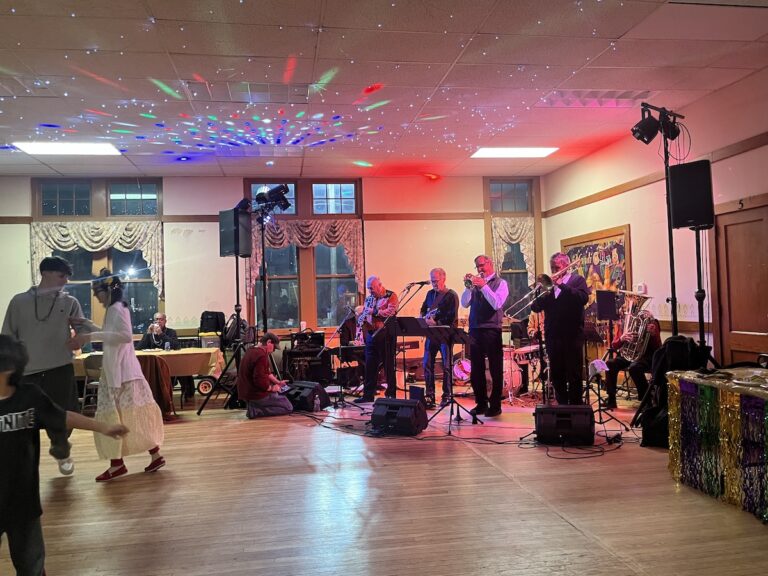Salad Days No Longer: Vegan Station Chef Zinowski Provides Soulful Fare
The vegan station at the Usdan Marketplace holds a special place in many students’ hearts. To some, it’s the only place where they can reliably find food that suits their dietary needs. To others, it’s simply the best food that can be found at lunch. To others still, its appeal is that it’s the place with the shortest line during the 11:54 rush.
“Vegan,” as the station is generally called in shorthand, is run during lunch by Chef Stephanie Zinowski, who is lovingly referred to as “Steph” by many of those who know her. For those who do not know her in person, many know her by name: She is the “Stephanie” of apple crisp fame. Zinowski came to the University 13 years ago, and she is responsible for the growth of the vegan program on campus. While the program started out small, she mentioned that she now often has to multiply her recipes 65-fold. Nevertheless, she hunts for innovative recipes that can serve a crowd.
“People come to my station for something different,” she said. “It’s not the same burgers, it’s not the same pizza, they just want to try something different.”
Last Thursday evening, Zinowski hosted a vegan cooking class for approximately 12 students in the Daniel Family Commons, where students learned to cook five recipes: aloo gobi (a spiced cauliflower and potato dish), cashew mac and cheese, spicy lentils, seitan piccata, and crimson cabbage slaw. The three-hour workshop drew a mix of vegans, vegetarians, and meat-eaters, and concluded with a dinner that all students seemed to enjoy, regardless of their dietary preferences. Zachary Brint ’16 inspired and organized the event, with the hope of improving his cooking skills and sharing Zinowski’s talent with others.
“As somebody who was initially scared of vegan food, but has been transformed into a vegan lover, that transformation has come about because of Stephanie’s cooking,” Brint said. “I have known Stephanie for three years, and so I said to myself, ‘I’m about to graduate and I don’t know how to cook this food that I love.’”
Brint expressed deep gratitude for Zinowski, who was working extra hours to teach the class, and for the University’s Resident District Manager of Bon Appétit Michael Strumpf, who responded favorably to the event and provided funding.
Students were pleased with the class, with many citing the opportunity to expand their dietary horizons and to work with Zinowski herself.
“This was definitely a highlight of my week!” Gerpha Gerlin ’16 wrote in an email to The Argus. “[I] was pleasantly surprised by the abundance of food we prepared! I think we completed something like five dishes in about an hour and a half.”
Brint himself was surprised by several things in the class.
“One, I can’t believe that Stephanie is able to take these recipes and cook them on such a massive scale and still make them delicious” he said. “Two… it was great to see how Stephanie showed us that everybody could possibly make vegan food at their own house.”
Brint added that the primary takeaway for the campus as a whole was reflected in the comments of another student, who cited the stereotype (and his own expectation) that vegan food was less desirable than other food, and yet considered the meal a resounding success.
The success of the class, and of the vegan station as a whole, cannot be simply attributed to vegan food—rather, it is the product of the care and effort that Zinowski puts into it.
Gavin Swee ’13, an alumnus who worked at the vegan station with Zinowski for several years, attributed the success of the food to Zinowski’s culinary mindset.
“Stephanie doesn’t cook what she herself would not eat,” he said. “And… she really makes an effort to order good, healthy, local, nutritious stuff, and… she puts a lot of effort and organization into her cooking. It doesn’t taste good just by itself, a lot of heart goes into it.”
Gerlin echoed that sentiment.
“Stephanie is a very sweet person,” she said. “Her dedication to her craft is tangible.”
Zinowski has been vegan since 1985, inspired by a vegetarian friend.
“The more I learned about what goes on in factory farming, the more and more I said that I can’t participate in this,” she said. “So it’s always been from the animal rights angle.”
She did not begin her career as a chef. Rather, she began by working in Stop and Shop, eventually becoming produce manager where she drew her inspiration. She noticed that an increasing number of people were buying vegetarian alternatives to meat, such as tofu and veggie burgers, which made her recognize that people were looking for non-meat options.
“One day I realized that’s how I could make my contribution to the animal rights movement,” she said. “There’s lots of people that are willing to protest and send letters to their congressmen to fight for animal rights, but they don’t necessarily know what to eat afterwards. [I thought,] ‘This could be my niche. I could cook and show people that vegan food is just as exciting and just as nutrient rich as anything else.’ So that was my end-goal.”
She went to the National Gourmet Institute in New York City, which emphasizes healthful cooking and eating habits, and ultimately was invited to lead the vegan program at the University, which had only begun the year prior. She has served as a pioneer in the position, ordering her own ingredients rather than operating through Bon Appétit, and forging connections with local suppliers. In spite of her love for cooking, however, her favorite part of the job has been interacting with students.
“[My favorite part is] just to hear their stories, their backgrounds,” she said. “Someone was saying the other night that their mom and dad were worried about her because she’s away at school, and she sends messages home all the time saying ‘I’m eating fine, food is great, don’t worry about me.’ So it’s that sort of thing that is satisfying.”
Swee is one of the students Zinowski has formed a connection with—a connection strong enough that it continues several years later.
“I found that Stephanie was always willing and ready to share about what went into food, how she made it, and so we had all these conversations and then they became conversations about life,” Swee said. “I’m from Singapore so we would talk about where I came from, talk about my family, and we talked about Steph’s life as well. And then we found we were really close.”
In some ways, the most challenging part of her position is logistics, especially in the cramped Usdan building.
“Her job is by no means an easy one, because she’s managing the entire station by herself at least for lunch,” Swee said.
Zinowski confirmed this sentiment.
“I don’t have enough hands,” she said. “I only have two hands and x amount of time, so a lot of my struggle is getting things done on time for lunch. It’s so crazy. We’re in the basement—god forbid you should forget something.”
Fortunately, Zinowski says she has found her groove. Her menu operates on a one-month cycle, and she has learned the most efficient and desirable way to prepare and pair the dishes. Now and then she will introduce new dishes, if she is confident that she will be able to scale them up to feed the entire campus. Her two new dishes this semester, an Ethiopian lentil dish and Tikka Masala, have proven to be crowd pleasers.
Students at her cooking class discussed their favorite dishes of hers. Her cashew fried rice was frequently cited, along with peanut Pad Thai, a wild rice salad, Aloo Gobi, and various lentil dishes.
Zinowski weighed in about the push for “Meatless Mondays” on campus, supporting the idea but also suggesting that it might be wise to begin with an educational campaign first.
“It’s worth a shot,” she said. “People have it in their heads, ‘Oh, I want my burger, gotta have my burger’ so we would be denying their burger rights.… Maybe a month ahead of time we do some educational stuff, like how much gas is produced, or how much water it takes to make a pound of beef.”
She added some sage advice for the movement’s leaders.
“When you piss somebody off they’re going to listen to you even less, because they’ll feel they’ve been… denied their rights in some way, they’re not able to have their pepperoni pizza,” she said. “So like I said, ease them in, throw the facts at them beforehand, they may be more apt to listen.”
To Zinowski, the best means of affecting society’s dietary habits is simply to make vegan food a desirable option, something that she has clearly done for the students on this campus.
“If something is good, and somebody enjoys it, it shouldn’t matter whether there is meat there or not, as long as it’s a good meal and they leave there satisfied,” she said. “So that’s always been a goal of mine: to make something taste good enough, be interesting enough, that somebody doesn’t have to go grab the pork chop or the burger or whatever. Because every time somebody eats at the vegan station, that’s fewer animals that have to die. Make it as good as you can, be as appealing to people as it can be. And hopefully they don’t need to eat meat that day or that meal.”
For many, and increasingly so after Thursday’s cooking class, Zinowski seems to have achieved her goal. She has provided students with a personalized experience that transcends standard college fare, and increased awareness about the possibilities of a vegan or vegetarian diet.
“Wesleyan students and the University are really lucky to have her,” Swee said.







fuck yeahhhhhhh